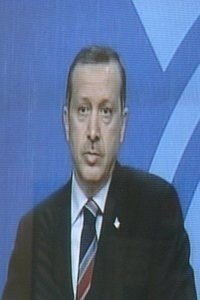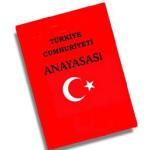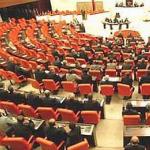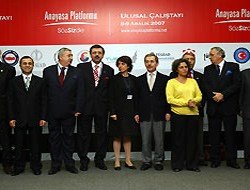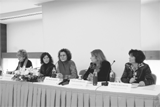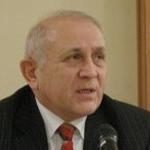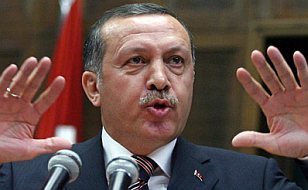In a press meeting concerning the Justice and Development Party's (AKP) preparations for a new constitution, Prime Minister Erdogan said that there was no text yet, and that he found the manner of criticism "ill-advised".
Erdogan has said that once the AKP has created a draft text, it will be presented to political parties, academics, universities, NGOs and the press, who can express their opinions and criticisms. After taking these into account, they would then bring a draft to parliament. Should the draft be accepted by Parliament and ratified by the President, they would also call a referendum on the constitution.
Answering questions by journalists, Erdogan said that he was in favour of university students being able to wear headscarves. The (university) Rectors' Committee had today called for a postponement of work on the constitution until the referendum on 21 October and had said that there was no legal basis for changes related to the headscarf.
"Let them do their own job"
Erdogan reacted by saying, "The Rectors' Committee is not to decide on the process of working on the constitution, they do not have that authority. Let them do their own job."
Asked how they would know whether a decision made by society would be legal, he said: "It is not our problem what the people say. We are aiming at creating a liberal constitution. We will take suggestions and we will present it to the people. If they say no, then we continue with the current constitution. If they say yes, then the new one will come into effect."
Below are some of the comments that Erdogan made in his statement:
"The current constitution has lost its integrity; it does not meet expectations"
"The project is aiming to meet the demands for a new constitution which have been made by nearly everyone in Turkey for years. The 1982 Constitution has been amended 13 times. Together with the introductory article, 65 articles were changed, 11 of them more than once. If one considers that there are a total of 177 articles and 16 temporary articles, that means that around a third of it has been changed.
The internal integrity of the current constitution has been lost. Because it reflects the spirit of the time it was prepared at, because those preparing it did not ask for anyone's contributions, it has continuously been criticised, even though it was passed by referendum at the time.
No one can say that the 1982 Constitution was created in discussion or by asking groups for their opinions. It is a constitution which was created totally by those appointed.[...]
That is why it has become the source of dissatisfaction and discussion. People have always wanted a new constitution. Several NGOs have competed with each other to create new ones. When we worked on a draft, we used their examples. There are constitutions prepared by the Union of Bar Associations, the Union of Chambers and Stock Exchanges, and the Association of Turkish Industrialists and Businesspeople (TÜSIAD).
The projects and reform packages which were passed in order to become consistent with the EU have not fulfilled people's expectations completely. Our point of departure is there."
"It will be prepared with the greatest agreement possible"
"We have set out saying that the time has come to arrive at a constitution which is generally accepted, which represents the people's shared mind and will, which is worthy of Turkey, which is new, integrating and modern.
This is a promise we gave our people in the squares before the elections.
This constitution will be predicated on every citizen's sensitivities, and on the protection of the republic's laicism, of a democratic, social state based on the rule of law, and of the people's basic values. Freedom and welfare, democratic and economic development cannot be thought of separately from each other.
A legal framework which we feel is needed for a free and well-off Turkey will be in this constitution. It will be a text which will open Turkey's future, which will be based on the republic's founding ideals and Atatürk's modernisation aims, and which will meet Turkey's expectations and needs.
Without a doubt, constitutions have to consider a definition of compromise, and have to comprise articles which society in general can agree on. It will be prepared with the greatest agreement possible and presented for referendum."
"There is no draft text yet"
"However, there is not yet a draft text to be discussed. [...]Discussions, criticisms have begun.
This is not a draft which we have arrived at with our thoughts and negotiations with party representatives. This is what we did at Sapanca [where there was a camp for the constitution working group]. Then, the party's responsible high commission works on it. We did that until late last night. Now our friends will continue.
When the draft has been completed, it will be sent to groups ranging from political parties to universities, from NGOs to the press, in order to ask for suggestions. It will be published on the Internet. Criticisms will be evaluated. Thus we will have opened it to public discussion.
This has not been done before. We are still at the beginning, at the first stage. Once it has been discussed enough and all parts of society have made their suggestions, the draft will be improved and sent to Parliament as a bill.
It is not the AKP which will send this bill. It is just preparing internally. I find it wrong to interpret this preparation differently.
I see the academic discussions about the preparations as useful, but find the manner of approach ill-advised. We want everyone to participate. It is interesting that they have started a bombardment without having seen a text.
Like everyone, I want the greatest possible compromise, as does the party. This was our aim when we started. We are not making an AKP constitution, we are trying to make a Turkish Republic Constitution.
I find these early discussion manipulative [...]. "
Headscarf discussions
"There are people who are trying to reduce the constitution discussions to one topic. This is very ugly. The things that will not change in our constitution are clear. Neither academics nor our friends in the party who have been charged with the project are preparing anything different concerning this issue. No one has the right to reduce it all to this article.
Parliament will decide on it and then it will be sent to the President. Then we will present it to the people in a referendum.
Seeing as we will have a referendum on it, we will apply whatever the legal time period is. This is a new constitution, not an amendment. We see our people as the agents of approval. Why are people disturbed by this?
[...] Turkey should not waste any more time and energy on unnecessary fears; we do not want the young generation to lose out anymore. We must aim at understanding and trusting each other. We have to lock around shared aims and values."
Discussions about a constitutional assembly
"Given that Parliament has been allowed to change a third of the Constitution, why should it not be allowed to make all of it? The constitutional assembly was not made up of chosen people, but of those appointed in 1982. [...] This is unacceptable. We will hear everyone's opinion. We want to meet with everyone who has suggestions. We do not have any prejudices or conditions.
"We are not in a hurry"
Wait until a draft text has been crated. No one is going anywhere. We are not in a hurry. We will have time for discussion.Our aim is to have [...] wide social agreement.
I see this process as an important opportunity for a great compromise. I invite everyone to get rid of their prejudices. Turkey will write, make and ratify a constitution which will be more fitting and provoke minimal criticism."
Headscarf rulings
Responding to the argument that there was no legal base for changes in laws on wearing a headscarf, Erdogan said:
"There is no legal base, which means it is contradictory. The preparation of a constitution is aimed at creating a legal base. It is a different matter how much base there is for such an issue. The law says something different, the European Court of Human Rights has other interpretations. It is always discussed."
Again referring to the headscarf, the Prime Minister said, "I have said it many times. We are talking of freedoms. They call it a political symbol. That is wrong. Then it would have to belong to a certain party. I do not accept the term 'türban' [used for contemporary ways of wearing a headscarf]. It is called a head covering. It is not the symbol of a party. Do the other parties not have any [women supporters who cover their heads]? The issue is a different one; do not make me say it."
Responding to predictions that, should the headscarf be allowed at universities, uncovered women would be pressurised, he said: "We could also think the other way round. They should not worry. During five years of AKP government, what problems were there? If you talk about pressure, then you need to think the other way round. Then you may see different problems. Calling people who wear headscarves oppressors is disrespectful to the freedom of religion and conscience."
"If the process of making a constitution belongs to the rectors, then there is no meaning in the existence of a Parliament. Everyone should know their place. We are open to contributions from universities. But legislation, the duty of politics, cannot be seen as theirs. That duty lies in Parliament. When Parliament makes a law, it takes advice from everyone.
[...] The real aim is to create tension in the country. If you have contributions, then help, and we will thank you. But when people try to confuse others, then we are saddened. This must not happen. In the 22 July elections, the people showed their will and they have to respect that.
They may not accept our party or share our thoughts. We are not making a constitution for our party, but for Turkey. If you have something to give, then do.[...]"
Mistaken ideas about immunity
Asked about the immunity of MPs and bureaucrats, Erdogan said:
"I do not accept that MPs have immunity. There is only a postponement of judgment with MPs. People are mistaken on this issue. As soon as parliamentary duty ends, the judiciary period begins. But for others this is different.
There is also no statute of limitations for MPs, unlike for others." (TK/AG)





